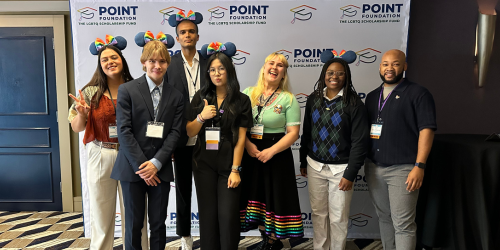LGBTQ+ Terms and Definitions
Updated March 2025
DOWNLOAD RESOURCE
Language within and about the LGBTQ+ community is constantly evolving. Acceptable terms change quickly and frequently. The list below are terms that come up frequently with Point’s scholars or tend to be lesser known.
Review this resource to better understand current best practices when supporting LGBTQ+ college students. It is always advisable to check multiple sources and compare information. For a longer list of terms, check out the Human Rights Campaign's Glossary of Terms.
TERMS
Ally: someone who is actively supportive of LGBTQ+ people. Mainly used for straight and cisgender allies as well as those within the LGBTQ+ community who support each other.
Cisgender: someone whose gender identity corresponds with the sex assigned to them at birth.
Cisheteronormativity: the combined effect of social policies, expectations, and assumptions that normalize and naturalize heterosexuality and a binary system of assigned sex/gender.
Drag: the theatrical performance of gender(s), often including makeup and costumes. Performers who present in a feminine manner are called Drag Queens, while performers who present in a masculine manner are called Drag Kings. Drag performance refers to expression and performance, which is different from transgender, which refers to gender identity.
First-generation students: students whose parent(s) did not complete a four-year college or university degree. Many LGBTQ+ students are first-generation.
Gender dysphoria: the distress caused when a person’s assigned sex at birth and assumed gender is not the same as the one with which they identify.
Gender expression: external appearance of one’s gender identity, usually expressed through behavior, clothing, haircut or voice, and which may or may not conform to socially defined behaviors and characteristics typically associated with a particular gender.
Gender identity: one’s innermost concept of self as male, female, a blend of both or neither – how individuals perceive themselves and what they call themselves. One’s gender identity can be the same or different from their sex assigned at birth.
HRT (Hormone Replacement Therapy): a type of gender-affirming treatment that allows trans and gender-expansive people to feel more at home in their bodies with changes in body hair, vocal tone, or breast size.
Indigiqueer: a term used by some LGBTQ+ Native people. This term emphasizes the intersections of race, gender, and sexual orientation.
Monogamous: individuals who are intimate or involved romantically with one person at a time.
Nontraditional students: Many people understand the “traditional” college experience to be enrolling full-time in a residential college immediately after graduating from high school. Against this backdrop, a “nontraditional” student is anyone whose college experience departs from that model, e.g., students who begin college more than a year after high school graduation, work full-time, have dependents, etc.
|
Today, the majority of college students (particularly LGBTQ+ students) would be considered “nontraditional.” For that reason, we recommend using more specific descriptors such as “adult students” or “commuter students” instead of “nontraditional.” |
Polyamorous: individuals who have the desire for multiple consenting intimate relationships at the same time.
PrEP (Pre-Exposure Prophylaxis): a preventative prescription medication taken by those at higher risk for HIV.
QTPOC: acronym for Queer and Trans People of Color. This term emphasizes the intersections of race, gender, and sexual orientation.
Queer: reclaimed from its earlier negative use, this term is used by some LGBTQ+ people to describe themselves and/or their community.
Sexual orientation: who one is emotionally, romantically and/or sexually attracted to.
In general, it is a best practice not to ask personal questions of people we have just met. This is particularly pertinent within the LGBTQ+ community. Please do not ask about details such as dating/sex life, surgeries, "real" or birth names.
BEST PRACTICES
Do…
- Keep up to date on LGBTQ+ issues in higher education. In partnership with the Williams Institute, Point has explored the most common challenges LGBTQ+ college students are facing:
- Educational Experiences of LGBTQ+ People of Color
- Experiences of LGBTQ+ People in Four-Year Colleges and Graduate Programs
- Community College and the Experiences of LGBTQ+ People
- Transgender Students in Higher Education
- Federal Student Loan Debt Among LGBT People
- COVID-19 and Students in Higher Education
- Ask about pronouns and share your own. While she/her, he/him, and they/them series of pronouns are most popular, there are many more. It is okay to ask someone their pronouns to ensure you address them correctly. It is becoming more commonplace to include pronouns in introductions, email signatures, and Zoom names.
- Support student-led efforts. On many campuses, students are the ones doing the heavy lifting to make change for LGBTQ+ students. Support where you can and call for campus support.
- Remember that a person is more than their identity. While it is important to acknowledge and celebrate all identities, it is essential not to put someone in a box based on a few aspects of their identity.
- Speak up when you observe anti-LGBTQ behavior on (and off) campus. Challenge the assumptions others hold and perpetuate.
- Refer them to Point’s scholarships. In addition to financial support, Point provides leadership development and support from a network of LGBTQ+ and ally scholars and alumni.
Do not...
- Ask questions about dating preferences. Students might open up and share once trust has been built, but you should not be the one initiating these conversations. This is particularly true for polyamorous folks who have more than one partner.
- Ask questions about transitions. This includes asking about names prior to transition (deadnames), surgeries, hormones, etc.
- Feel the need to force a connection between all the LGBTQ+ people in your life. Although building LGBTQ+ community is fantastic, your loved one may want to build it themselves with the people they choose. Trying to bring people together just because of their shared sexual orientation or gender expression can be perceived as reductive.
- Fret over pronoun missteps. Mistakes can happen. If you use an incorrect pronoun, state what pronoun you meant to use and move on without dwelling on the mistake. If someone corrects you, simply say thank you, correct yourself, and continue. Saying thank you empowers the person to speak up while an overdrawn apology focuses on the mistake.
Related Posts
October 31, 2022, teampoint

Challenging School Policies and Decisions
DOWNLOAD THE RESOURCE Updated March 2025 Despite great strides in LGBTQ+ belonging in recent years...
October 31, 2022, Point Foundation
Collaborating with Student Changemakers
DOWNLOAD THE RESOURCE FOR ADMINISTRATORS AND EDUCATORS Despite great strides in LGBTQ+ belonging in...
April 09, 2025, Point Foundation

How Employee Resource Groups Can Support LGBTQ+ and Ally Students
At Point Foundation, we help LGBTQ+ and ally students achieve their educational dreams and unlock...